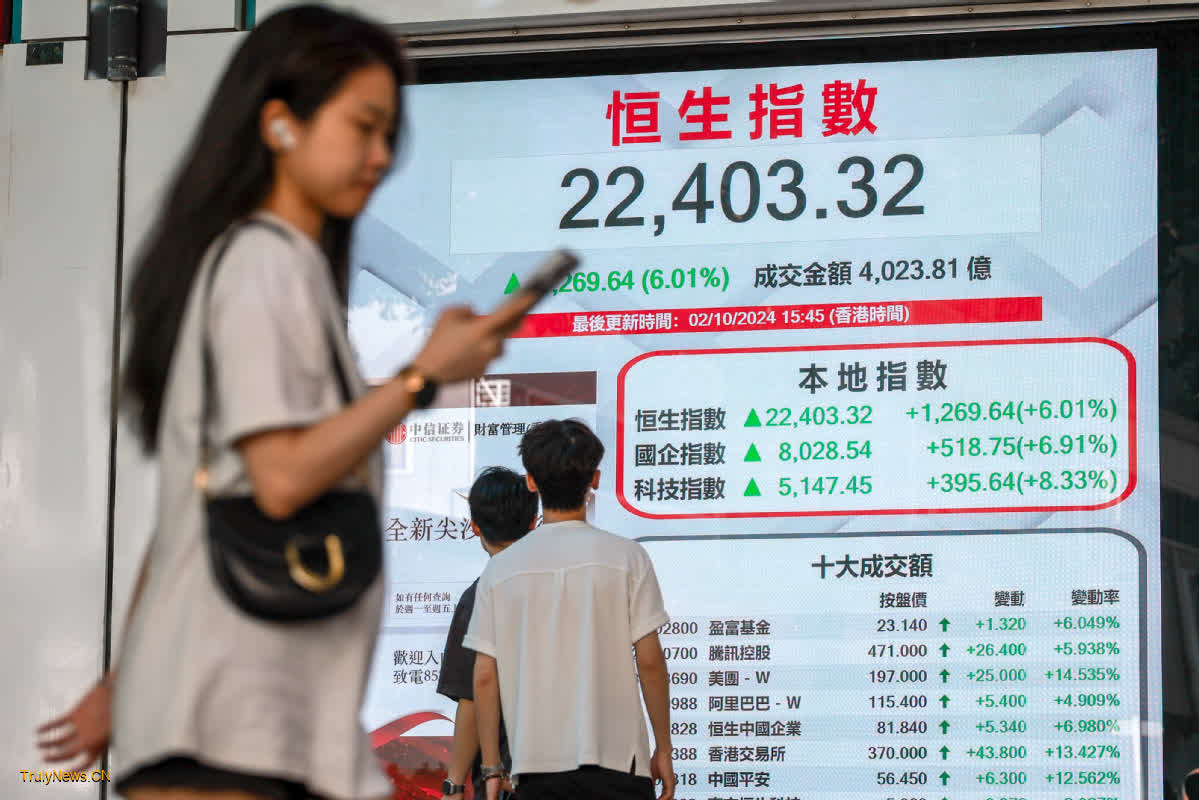
Analysts voiced cautious optimism on the Hong Kong stock market after its stellar rally cooled off on Thursday, saying investors are anxiously waiting for more concrete signs that a sweeping stimulus package could lead to improvement in economic fundamentals.
The benchmark Hang Seng Index, the majority of which comprises the shares of mainland companies, retreated as much as 4.6 percent before narrowing down to a 1.47 percent loss on Thursday, ending a six-day winning streak. Property developers listed in the city led the drop while a measure tracking the tech sector ended 3.46 percent lower.
Kenny Wen, head of investment strategy at KGI Asia, saw it as a “healthy correction” for Hong Kong stocks as they had been extremely overbought in the past few days. The benchmark’s relative strength index had risen to 95 — its highest level since 1970. Traders typically interpret a reading surpassing 70 as an indication of prices gone too far.
However, as the HSI only dropped by around 300 points on Thursday, it reflects that “the sentiment is still quite good and investors are willing to buy on dips”, Wen added.
The Hong Kong market remained the standout performer over the past week, recording a rebound of over 20 percent. Elsewhere, the S&P 500 was almost unchanged over the same period, while Japan’s Nikkei 225 Index rose 1.6 percent.
Hong Kong-based stock commentator Conita Hung Lai-ping said that it was reasonable to see investors profit-taking following such a trading frenzy, considering the years the Hong Kong market has been underweight.
The recent inflow of money has been largely driven by China’s broader-than-expected stimulus package revealed last week. It includes a reduction in the reserve requirement ratio and existing mortgage rates as well as 800 billion yuan ($114.9 billion) of liquidity support tailored to the equity market. Four first-tier cities also eased curbs on purchasing property.
The market cool-off came as the Chinese mainland closed its markets during the National Day holiday period from Oct 1 to 7, which experts said could translate into an absence in southbound money via a cross-border trading mechanism that allows Chinese mainland investors to trade Hong Kong-listed shares.
On equity outlooks, Hung said that there is plenty of money on the sideline closely watching two factors — whether the stimulus package results in a recovery in economic fundamentals and whether there are more measures in the offing if the stimulus works.
The National Day holiday will be an ideal indicator. “If the data coming out from the Golden Week turns out positive — say if there’s increased spending or real estate transactions — then it could have a further boosting effect on investment sentiment and stock performance in both mainland and Hong Kong markets,” she said.
In a sign of spending growth, the Chinese mainland is expecting 1.94 billion cross-regional trips to be made during the holiday, said Li Yang, vice-minister for transport. That means an average of 277 million daily trips, an uptick of 0.7 percent from 2023 and almost 20 percent higher than in 2019.
Strong headwinds remain nevertheless as Charu Chanana, head of foreign exchange strategy at Saxo Markets, raised questions about the sustainability of the stimulus package and difficulties in resolving the Chinese mainland’s structural issues of debt, deflation and demographics.
“But the direction of travel is encouraging, and this can help to repair some of the confidence levels in the economy and policymakers,” Chanana said.
What is still needed is the execution of the announced measures, coordination from other policies particularly on the fiscal side, and more follow-up measures to continue the momentum, she added.
evanliu@chinadailyhk.com